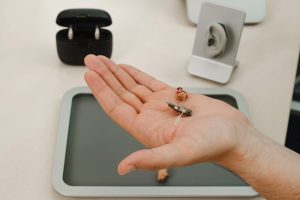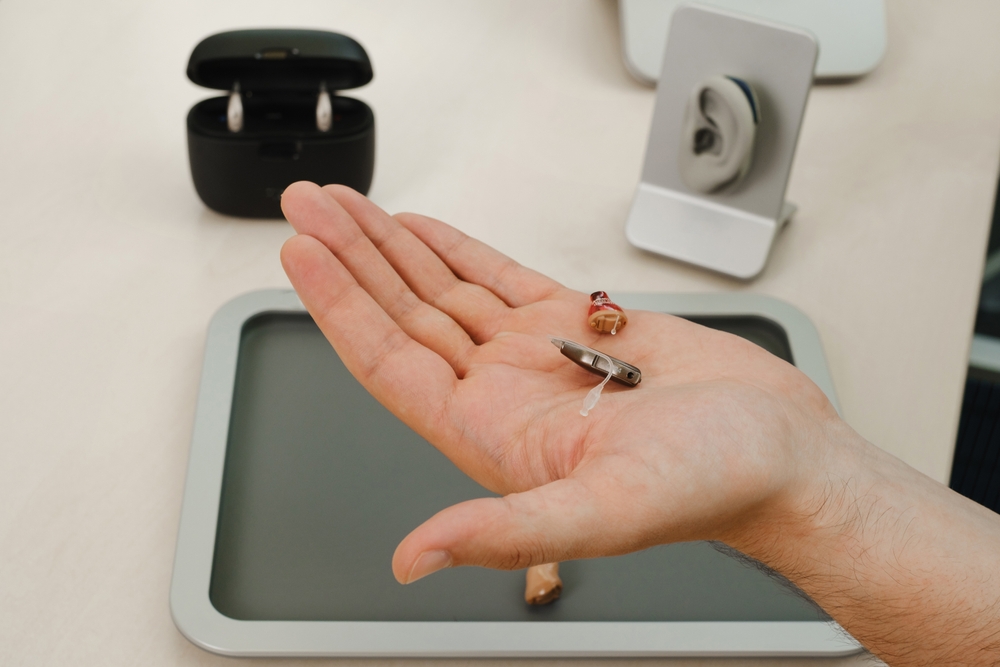 Hearing aids are marvelous devices that help people with hearing loss cope with their struggles. They break down communication barriers, improve social interactions, and reduce mental health issues for the users. With so many different types of hearing aids available, they can also support the users’ chosen lifestyle.
Hearing aids are marvelous devices that help people with hearing loss cope with their struggles. They break down communication barriers, improve social interactions, and reduce mental health issues for the users. With so many different types of hearing aids available, they can also support the users’ chosen lifestyle.
However, as with all electronic devices, maintenance is vital. Caring for your hearing aids will extend their lifespan. You can also gain other benefits, such as optimal performance and keeping them hygienic.
Read this guide for several tips on how to care for hearing aids and expand their lifespan.
Reasons for Caring for Your Hearing Aid
An expanded lifespan is not the only reason why you should carefully maintain your hearing aid. Hearing aids deserve the best possible care also for the following reasons:
- Maximum functionality: Regular maintenance keeps hearing aids functioning at their best, ensuring clear sound quality and consistent amplification.
- Prevention of costly repairs: Routine cleaning and careful handling reduce the risk of dirt, moisture, and damage that lead to expensive repairs and replacements.
- Hygiene and health: Regular cleaning prevents infections caused by excessive earwax buildup and bacteria. Keeping it clean will ensure your ears stay healthy.
- Warranty coverage: Many hearing aid warranties require proof of proper maintenance. Neglecting care might void the warranty and saddle you with a costly repair fee.
Daily Maintenance Tips for Hearing Aids
Keep your hearing aid functioning well by performing daily maintenance as follows.
Clean it every day
A daily clean-up is necessary to remove dirt, earwax, and debris that affect the hearing aid’s functionality and sound quality. To clean your hearing aid, use a soft and dry cloth to wipe down the exterior. Use a brush or a pick to remove earwax. Clean vents and microphone ports with care by following the manufacturer’s instructions.
Avoid using water or dangerous substances
When cleaning the hearing aids, avoid using water, alcohol, or household cleaning agents. These liquids can damage the delicate components of your hearing aids. Stick to cleaning solutions or kits recommended by your audiologist. If your hearing aid manufacturer offers cleaning kits, consider getting them as well.
Keep them dry
Moisture threatens hearing aids. Sweat, rain, and humidity can seep into the device and cause electrical damage. Keep your hearing aids dry by removing them before showering, swimming, or engaging in water-related activities. Furthermore, use a dehumidifier or a hearing aid dryer overnight to get rid of moisture buildup.
If your hearing aid gets wet, avoid using typical heat sources like hair dryers to dry them. Excessive heat can also cause additional damage. Consult a professional for advice on water damage.
Hearing Aid Care at Night
It’s not recommended to wear your hearing aid while you sleep. Instead, air them out overnight as moisture can accumulate during your sleep. The best practices for hearing aid care at night are as follows.
- Remove the devices before sleeping: It will prevent discomfort and reduce the risk of ear infections. Your ears can also feel free of pressure.
- Clean them before bed: You can remove the debris accumulated by your device during the day right before bedtime.
- Store them safely: Use a drying box or dehumidifier to store them at night, which will remove excess moisture. Proper storage will ensure your aid is ready for the next day.
- Perform inspection in the morning: A quick morning inspection will notify you of issues like cracks, moisture, or damage to the microphone and speaker ports.
Other Hearing Aids Maintenance Tips
Here are some other tips to follow on caring for your hearing aid.
Avoid exposing them to extreme conditions
Hearing aids are sensitive to extreme temperatures and humidity. Excessive heat can warp the device, while cold weather may drain the batteries faster. Avoid these risks by keeping your hearing aid away from direct sunlight (e.g., don’t put them on a car dashboard). Use accessories like hearing aid covers or sweatbands to protect them against extreme weather conditions.
Keep them away from pets and children
Pets and children may mistake hearing aids for toys. They may chew, drop, or mishandle hearing aids, resulting in severe damage. Therefore, always store your hearing aid out of reach when not used. Consider educating your family members about the significance of these devices and how to handle them carefully.
Preserve battery life
Hearing aid batteries demand their own maintenance to preserve their life. When batteries lose their charge, they affect your device’s performance. If your device produces weak or distorted sounds, frequent beeping, or is suddenly dead, it’s time for a battery change.
When changing the battery, ensure the device is off. Also, avoid touching the battery with your fingers to prevent corrosion. You can also optimize your device’s battery life by turning it off when you’re not using it. If you’re not using the hearing aids for a long period, remove the batteries to preserve both the battery and the device.
Note that rechargeable hearing aids require specific care. Follow the manufacturer’s guide for change cycles and avoid overcharging to keep the battery healthy.
Schedule professional maintenance
Regular check-ups with audiologists is just as essential as your daily maintenance routine. A professional maintenance with audiologists can detect issues that may not be obvious to you. They can also perform deep cleaning and adjust settings. Consider scheduling a pro maintenance appointment at least once a year or as your audiologist advises.
Conclusion
Hearing aid maintenance starts with daily cleaning, keeping them dry, and avoiding using liquids or solvents when cleaning. Nighttime care for hearing aids is also crucial to keep it hygienic. Keeping them away from pets, children, and extreme temperatures, as well as caring for the battery, will ensure your hearing aids last a long time. Lastly, schedule an annual professional maintenance to keep your hearing aid working optimally.
Find out which hearing aid brands are available at El Dorado Hearing. Get in touch with our audiologists to consult on hearing aid care tips and maintenance.




Leave a Reply